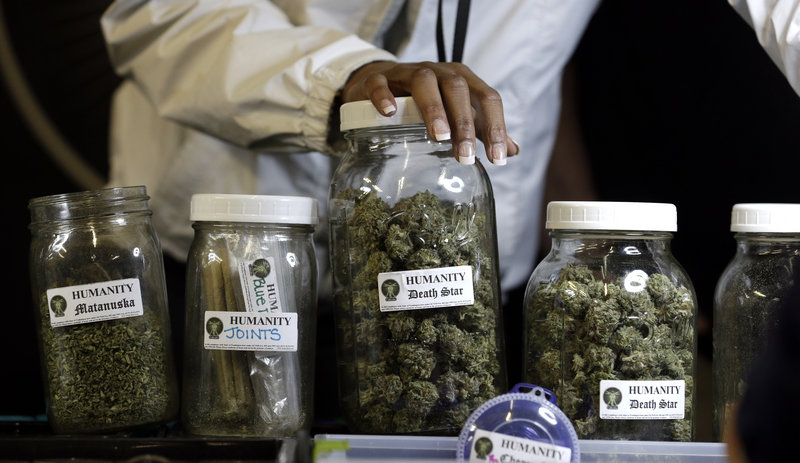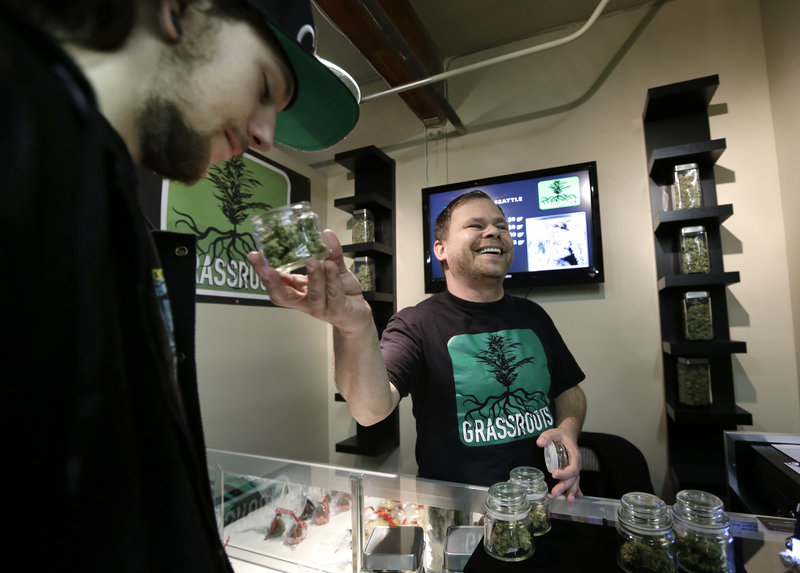WASHINGTON – Calling it a “gold rush mentality,” Washington state’s top marijuana consultant predicts that thousands of people will apply for licenses to sell and produce the drug for recreational use as the state prepares to open 334 pot stores by June 1, 2014.
All the privately run retail outlets will be in clear violation of the federal law that bans marijuana, but that’s expected to do little to slow the number of applicants.
“There will be a ton. And I think a lot of people are going to get badly burned because they’re not going to succeed in business. There’s going to be a lot of competition,” said consultant Mark Kleiman, who’s also a professor of public policy at the University of California, Los Angeles.
The state intends to begin accepting applications Nov. 18, after the Justice Department urged federal prosecutors last week to ignore the illegal activity in Washington state and Colorado, the first two states to legalize marijuana for all adults.
QUESTIONS UNRESOLVED
On Wednesday, the Washington State Liquor Control Board followed up by issuing revised rules for its pioneering marijuana system. While the board capped the number of stores at 334, including 21 in Seattle and eight in Tacoma, there’ll be no limit on the number of producers and processors, said Brian Smith, a spokesman for the board.
As excitement builds in the industry, key questions remain unresolved, however. Among them:
Will the feds now go further and allow marijuana shops to accept credit cards, make deposits at banks and use armored trucks to haul their cash?
And what price will the United States pay if it’s found in violation of international treaties aimed at cracking down on drug trafficking?
“This presents a lot of problems for U.S. diplomats abroad negotiating drug policy,” said Kevin Sabet, a legalization opponent who served as an adviser on drug issues to President Obama and former Presidents George W. Bush and Bill Clinton.
As Congress prepares to end its five-week summer break this week, the Senate Judiciary Committee is ready to search for answers on how to best govern one of the nation’s hottest new industries.
On Tuesday, the panel plans to examine the clash between state and federal marijuana laws, marking the first hearing of the year on Capitol Hill devoted solely to pot issues.
As part of its deliberations, Congress is under growing pressure to pass a law providing legal cover to anyone licensed by a state.
While such a law is unlikely to pass, marijuana advocates say it’s sorely needed.
“Washington and Colorado are in the process of issuing state licenses to commit federal felonies. That’s sort of a problem,” Kleiman said, though he predicted that the liquor board “is going to be surprised” by the high number of applicants. “I think there’s a huge gold rush mentality out there,” he said.
Dave Kois, 39, of Olympia, Wash., said he planned to apply for a license to sell the marijuana “edibles” that he now provides to medical marijuana dispensaries.
“It just seems like a smart move, basically,” Kois said. He said there was “no doubt” that the business still carried legal risks but he’s happy that federal prosecutors are being urged to stay away: “It’s good to see that they’re coming around, at least, and trying to respect the state’s law.”
SELLERS FACE LEGAL RISK
Without a change in federal law, Kleiman said, licensed sellers face a big legal risk. He noted that the Justice Department is only offering guidance to prosecutors and that U.S. attorneys still have the discretion on whether to file charges. He said the guidance did nothing to change the fact that marijuana remained illegal under the federal Controlled Substances Act.
Moreover, any guidance from the Justice Department could easily change when Obama leaves office in 2017.
As an alternative, Kleiman wanted the Justice Department to sign contractual agreements with Washington state and Colorado, allowing them to legally sell marijuana in exchange for their help in preventing interstate shipments of marijuana. He said the federal government didn’t have enough agents to do the job on its own.
With the Obama administration and Congress spending billions each year to fight drug trafficking, Sabet said, the new policy is sure to prompt questions from other countries. Earlier this year, the International Narcotics Control Board warned that a decision by the United States to allow the two states to proceed with their plans would violate drug-control treaties.
“What does a country like Mexico — that is being told to reduce its supply — do when the federal government tells the states (they can) go ahead?” Sabet asked.
He said U.S. diplomats would be forced into the uncomfortable position of having to scold other countries for not doing enough to fight drugs while they “pretend that Colorado and Washington are not under their purview.”
“That makes no sense to the international community,” Sabet said.
Send questions/comments to the editors.




Success. Please wait for the page to reload. If the page does not reload within 5 seconds, please refresh the page.
Enter your email and password to access comments.
Hi, to comment on stories you must . This profile is in addition to your subscription and website login.
Already have a commenting profile? .
Invalid username/password.
Please check your email to confirm and complete your registration.
Only subscribers are eligible to post comments. Please subscribe or login first for digital access. Here’s why.
Use the form below to reset your password. When you've submitted your account email, we will send an email with a reset code.